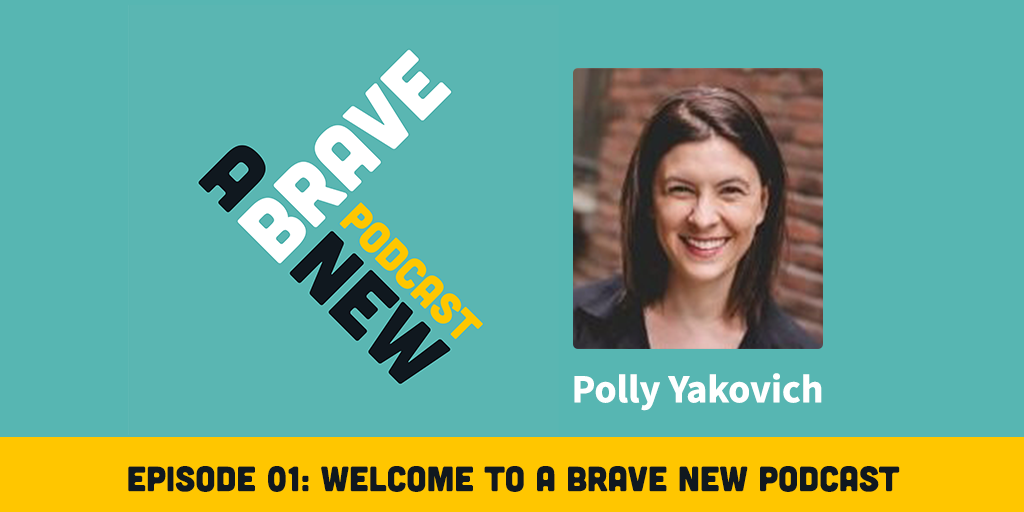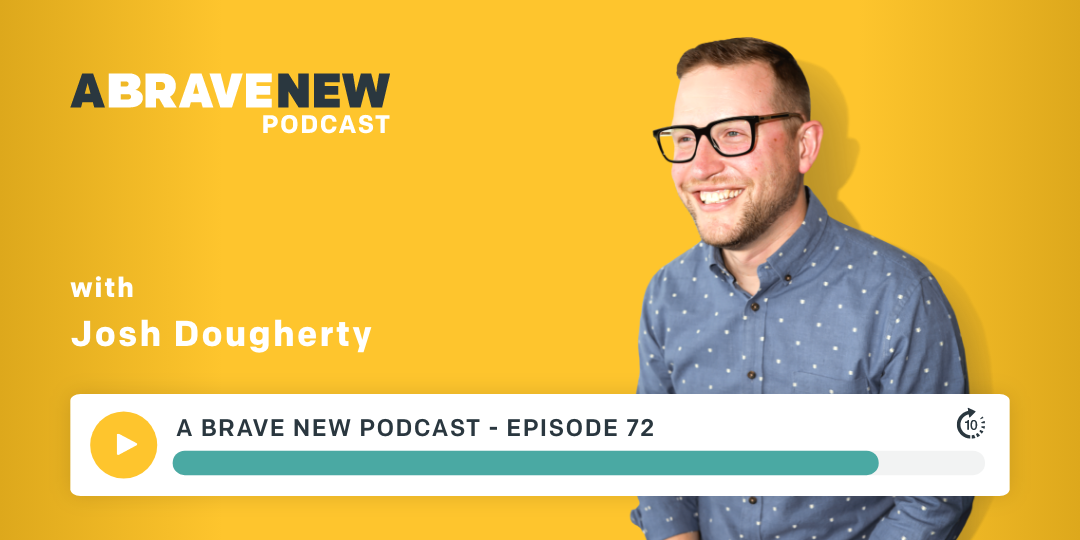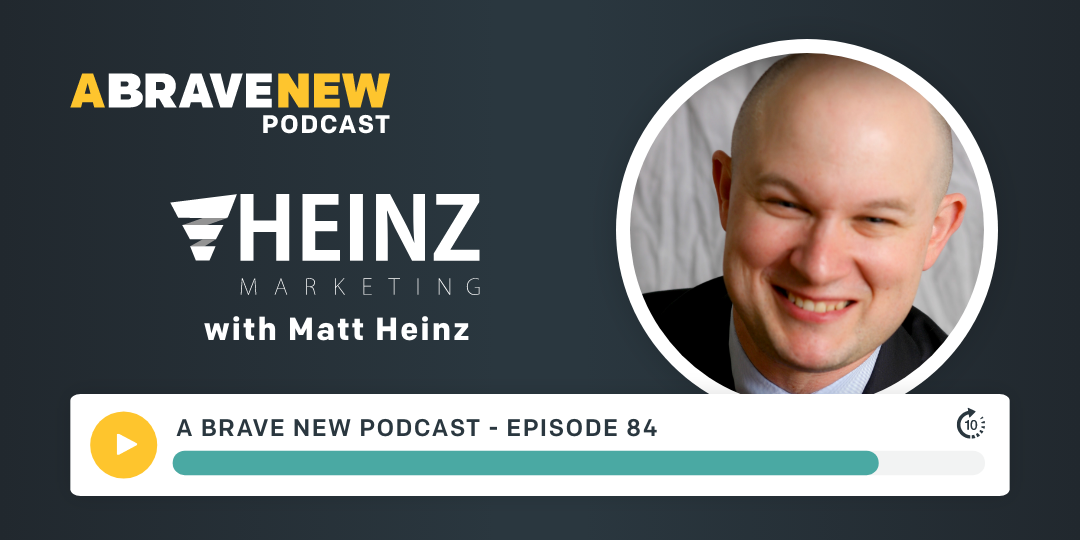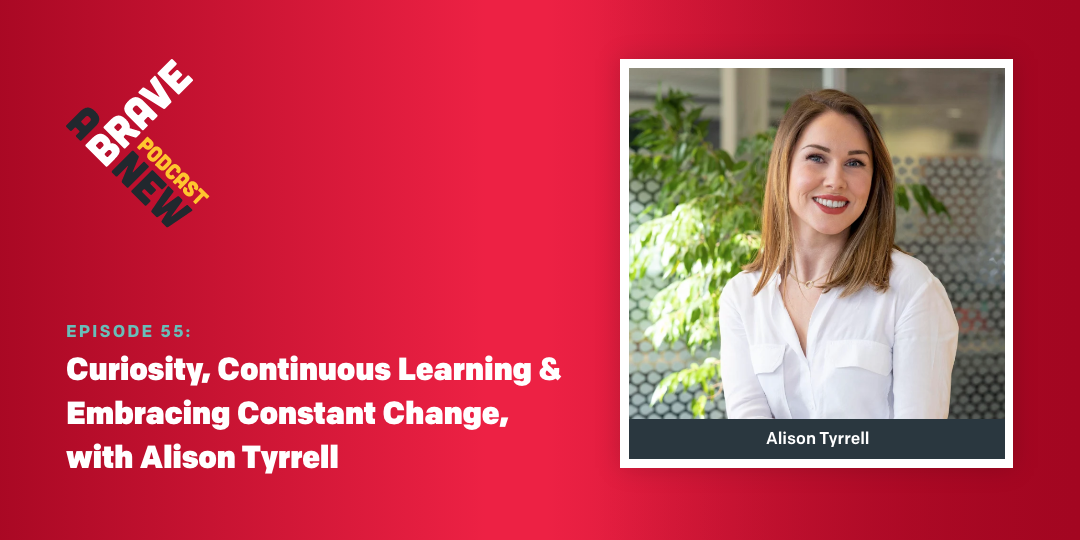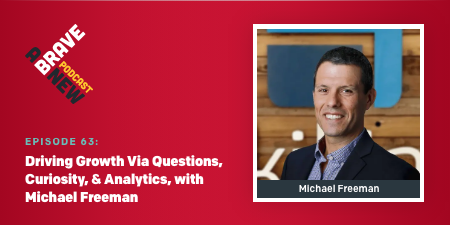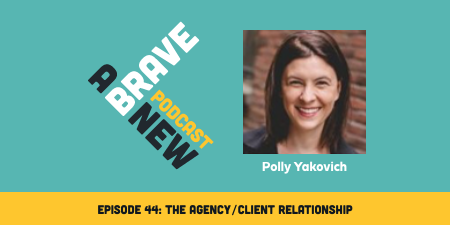Polly Yakovich is Co-founder and Chief Strategist at A Brave New, a Seattle digital marketing agency focused on helping businesses accelerate their growth through inbound marketing, branding, and web design. She specializes in working with clients to identify barriers to their growth and overcoming them with strategic content and marketing tactics. She has more than fifteen years of experience in digital marketing and branding.
What you’ll learn about in this episode:
- How the book "Essentialism: The Disciplined Pursuit of Less" by Greg McKeown has had a tremendous impact on helping the A Brave New team not get more things done, but the right things done
- Why clarifying your priorities and using your time wisely can help you operate at your highest point of contribution - personally and professionally
- Why we often forget that we can say no, and we give our opportunity to choose away by default.
- Why most of the choices we make require a tradeoff, and why understanding your big priority and the things you value requires saying no, and staying focused
- Why it is important to protect your assets (time, sleep, health) and how doing fewer things that seem really good can free you to focus on the things that will be truly great
- How teams can benefit from essentialism, and highly productive teams are fueled by clarity
Additional resources:
- Discovering The Essential (And Learning To Say No)
- Essentialism: The Disciplined Pursuit of Less by Greg McKeown
- A Brave New Podcast episode 13 featuring Melanie Falick
Show Transcription:
Intro: Welcome to A Brave New Podcast, the podcast all about how brave entrepreneurial companies are unlocking their business potential using inbound marketing. Here is your marketing expert and host, Polly Yakovich.
Polly Yakovich: Welcome back to the podcast. Today I want to talk about prioritization or about your time. But mostly, I want today's episode to be a massive commercial for this book I read this summer that was recommended to me, Essentialism by Greg McKeown. I don't know if many of you have read it or heard of this book, but I loved this book so much that I've read it twice already, which is no small feat because making all of my way through a book is a challenge these days. But I've read it twice, I actually bought it for my entire team and we coincidentally decided to start a book club during the pandemic so we could stay connected to one another. And it is the subject of our September book club. So it's very timely to talk about the lessons of essentialism.
Polly Yakovich: So this year, at the beginning of the year, before we knew pandemics were really a thing and before our lives all really changed, I had this big revelation about my time. And for me, maybe it was the fact that I turned 40 last year, maybe the fact that I have a small child, maybe it's being a double entrepreneur and trying to run two companies at once, but I just really realized that time is my most finite asset and that I was not very good at prioritizing my time, being efficient with my time, consistently. Now I am very efficient at prioritizing my time in small chunks. But over time, things would sneak up on me and employees would hand me their monkeys to borrow from the 1974 Harvard Business Review story about how employees manage upward by bringing their problems to managers. And then the manager says, "Oh, I'll do that for you," or "Let me take that for you," or "Let me figure that out" or "Let me ask so-and-so about it," and essentially take the problems from other people.
Polly Yakovich: I always fell into the trap of doing that. I think also, especially when you're an agency owner, there's lots of things going on at any given time and you have to be pretty ruthless about prioritizing and constantly prioritizing in your mind, which is part of why I really love this book, because I think for people like me, balance isn't really the question any longer. And when we think about work-life balance or a balance as a mother or an owner or a spouse or whatever it is, I think that really, what I want to think about is what my priorities and how do I spend this finite resource I have, regardless of what I'm doing, whether it's work or personal, in the way that helps me feel, at the end of the day, that I've been true to myself in what I value.
Polly Yakovich: And so for me, that's more of the conversation. Obviously this is going to be a conversation about work, but I do think when it comes to becoming an essentialist, or being more efficient with prioritizing how we spend our time and energy, then we really are thinking about our whole lives and our whole person. So I've really tried everything. So one of the things I think is a really good skill that most high performers do is either the night before a work day or first thing in the morning, writing down the top three priorities and doing those before you do anything else or returning to them again and again, if you're interrupted, and not adding anything to the list before you do anything else.
Polly Yakovich: Time boxing is also a good strategy, I've tried that. But that's also aspirational because sometimes if I say I have an hour to do something and it ends up taking three hours and it's really important, I just take those three hours. Batching, I think is another really good way to prioritize your time. The Pareto principle really helps me a lot because I do think many times in the day, what are the things that I'm doing and how valuable are they? And usually 20% of the time you're spending or the efforts you're spending brings 80% of the value. And I think that that's really true. And so it's like, what are the 80% of things I'm spending my time on that aren't really helping or don't really matter.
Polly Yakovich: I saw this cool, on LinkedIn, a couple of weeks ago and it really spoke to. To me, it's from Neil Strauss and it says, "The stress we have about work, we need to do in most cases is harder on us than the work itself." So I hear this a lot from all of our employees too, "We're busy, we're busy, we're busy. There's so much going on. We're really busy. Everything's really busy. I don't know how I'm going to get it all done, I'm really busy." And so this is why I think for us as an agency, really looking towards this essentialism becomes really vital to prioritizing how we are seeking about our clients. Are we always doing the best, highest thing for them, or are we getting lost in our task list and just becoming task monkeys, checking off things on our tasks and not thinking about how they relate together.
Polly Yakovich: So his book is broken down into four sections, and I want to spend a little time talking about each. But the first is essence. What is the essence of an essentialist? The second is explore. What are the vital few things that really matter, and how do I remove the trivial things of which most things are probably trivial? And then eliminating how stop saying yes to everything and trying to please and learning what doesn't matter anymore, and then executing. And I think the point of the book is execution becomes actually exponentially easier when you do the first three things, because then you're naturally falling into a pattern of being able to choose the most important things and set aside the rest. But as I'm getting started, I want to talk a little bit, I want to read to you from the book actually.
Polly Yakovich: He starts right away, early on in page five and he says, "Essentialism is not about how to get more things done. It's about how to get the right things done." And I think this is really difficult for most of us. It doesn't mean just doing less for the sake of doing less. It's about making the wisest possible investment of your time and energy in order to operate at our highest point of contribution, by doing only what is essential. So whether you're really good at this, or you struggle with it like me, I think all of us could really benefit from this, whether it's doing it personally or teaching our teams to focus on less on the busyness and more on the few things that really move the needle.
Polly Yakovich: I promise not to read to you the whole time, but I wanted to again, read on page seven. He says, "The way of the essentialist means living by design, not by default. Instead of making choices reactively, the essentialist deliberately distinguishes the vital few from the trivial many, again, eliminates the non-essentials and then removes obstacles so the essential things have a clear, smooth passage." In other words, essentialism is a disciplined, systematic approach for determining where our highest point of contribution lies, then making execution of those things almost effortless.
Polly Yakovich: So I know that's a little bit of a restatement of the first thing I read, but I wanted to say it again because I'm a marketer and repetition is everything. But also because really he gives us back the power over our lives, and I'm going to walk through this a little bit more, but I really felt this book gave me a lot of insight into how I am letting my life happen to me, how I'm letting my work life happen to me, how I'm letting my outside of work life happen to me rather than making choices about what I'm going to spend my time on. And that, I think, is really pivotal.
Polly Yakovich: I think it's going to take a lot of practice and exploration, but I think, I hope, I'm getting more on the right track. So I think one of the things, and he talks about this quite a bit, and he has so many case studies from teams and companies that do this well, I think one of the things that happens to most of us is as we get more opportunities or as we demonstrate that we're good at things or successful moments and things happen to us, we get more spread thin and more spread out. And if we're not experiencing this ourselves, then we're probably doing this to our high performers, right? We're asking them to do more, we're asking them to take on more because they were so successful at the things we gave them. And so one of the things that the book talks about with these opportunities is we are making choices all the time, but we lose our opportunities to choose because we don't ever say no.
Polly Yakovich: And so as these opportunities come, maybe I did this one thing and it opened this door to all these other things, but I kept holding on to all the things I held before because I can do more and I'm such a high achiever, we just don't think of it consciously as a choice. We just think, "Oh, I'm taking this opportunity," or "My boss asked me, so I can't turn it down," or maybe we are the boss and we're not making it a conversation at all, or thinking, "Oh, maybe the thing that made our employee super successful was the fact that they only held on to a couple of things at a time, so they could really do them well." But we just do lose this opportunity to choose. And I think part of it is obviously our ego, because we think I'm so good at all of these things.
Polly Yakovich: So we're going to try and do more, or I'm so good at these things only I can do them. I think that's true of a lot of managers actually, or people have recently become managers. But where does that extra energy and time come from? I think this is where we don't stop and think about energy and time as assets and the fact that they have to come from somewhere else. So if we are going to add to the things on our plate, we're going to take away from somewhere, right? For lots of us, that's been sleep, for lots of us, that's been our family. I think for lots of us, every time I say lots of us, that's something I've done or I'm doing, it's working out or being healthy physically.
Polly Yakovich: And so one of the quotes in the book is, "If you don't prioritize your life, someone else will." And this is true when we think of our lives in that broader sense, right? Whether it's personal or whether it's at work or whether it's just us and our lives, people are going to hand us so much and really the onus is on us to prioritize. And I also think managers should create an environment that protects for their employees, the ability to prioritize. So this gets down to a lot to a mindset, I think. We choose how to spend our energy or time. Everything is a choice, even a non-choice. And the book, the quote is, "The ability to choose can't be taken away, it can only be forgotten." So in fact, for many of us, we forgot that we can say "No" or we forgot that we can say "Not right now," or "Maybe later," or "Check back with me in six months," if it's an opportunity that we think sounds promising, but we're spread thin.
Polly Yakovich: So for me, one of the things that has been really helpful and annoying to a lot of people in my life is practice replacing "I have to" with "I choose to," and this is very annoying to people, particularly my mother, who I've chosen to practice on. But my mom is really queen of saying, "Oh, I have to do this. Oh, I have to do that. I'm so busy. I have to this, I have to that, my list is this. I have to that." And so I've practiced to her, thanks mom for letting me practice on you, "Oh, you choose to. You choose to make meals for those people, that's really kind of you actually," or "You choose to spend your time running around and doing this and that because you like the result." I think this is something that you have to make sure you have a really good manager employee relationship with.
Polly Yakovich: But I think leading employees gently to this conversation is important too. Because when I am talking to employees who are very much in this, I'm so busy, I'm so busy, I'm so busy mode, it's like, okay, well, how are you choosing to spend your time? And they may not feel like they have much choice. So that becomes a different conversation. But I think we always have a choice. And there's just so much noise. And part of being an essentialist is saying, I think in the best possible way, only a few things are really valuable here. And so what can I eliminate? What's the noise? And then also what's the trade-off? We can't have it all and we can't do it all. So we need to stop asking, how can I make it all work and ask instead, which problem do I want to solve?
Polly Yakovich: And which problem you're solving for yourself or your employee is going to lead to potentially much more creative solutions than really just mowing down that list, and being really honest about yourself that you can't make it all work. And it sounds like I'm really talking about balance and work-life balance, but really even at work, you probably can't make it all work. So particularly if you're an owner of a company like me or a CMO or any other leadership position, it's like what problems am I solving and what problems am I solving on behalf of my team? And can I think of framing that in a different way, rather than the problem that they think they've brought to me? I also think of all those illustrations that are like, I don't know, I see them on Instagram all the time. They're pie charts, right?
Polly Yakovich: And they're like, "You can be a good friend, good mom, good spouse, choose two," or "You can be fit and healthy and workout, get good sleep, do something else, choose two." And so those are silly, but I think the point of those is that you really can't do it all. And this is a conversation that's been much more in vogue lately is it's not about balance, you can't do it all, but it is really true. So I think it's a lot about what are the trade-offs, right? Every time I choose something or choose it by default, I'm choosing not to do something else or I'm sacrificing a piece of myself that's important. I think a lot of people talk about this.
Polly Yakovich: I've seen a lot of talk recently about sleep, right? Sleep is an asset that people trade-off all the time and they think it's fine, and it probably is fine for a while until it sneaks up on you. Right? There's a lot of negative health benefits from not sleeping, from not exercising, but we just don't prioritize ourselves. But when we put it in these terms and we think about healthy employees and healthy managers, it really all starts to feed together. Everything I do is a trade-off. I say yes to speaking on a panel, that means I don't work out that day. Right? And so if you can just start framing it that way in your mind, you can make choices. And maybe I make the choice to speak on a panel because it's an awesome opportunity and I'm going to speak with entrepreneur women in Seattle that are super fascinating and I want to learn from them. And so I choose that that day. Right? But in my mind, I don't let it happen to me, I'm choosing it.
Polly Yakovich: It's really interesting, the book talks about the word priority and I'm a little bit of a word nerd, can't say it. And priority is a word that came about in the 1400s, and it was singular because you can only have one most important thing, right? It was the very first or prior thing. And then 500 years later, so for 500 years, they clearly understood, I'm over-exaggerating the story but why wouldn't I, that you could only have one most important thing. And then in the 1900s, suddenly it's like, what are your priorities and what are your top five priorities, and what are your top 10 priorities, and you should only have one to three priorities. But really if you think about it, and this comes with all the backlash I think, with multitasking and multi-focusing really thinking about what is your priority, what is your overarching priority?
Polly Yakovich: And that's the way of the essentialist. So that's the essence of the essentialist. I want to just get into briefly how to explore. "How do we discern the trivial many from the vital few," says the book. Everything I'm saying is what the book says. You should really, if any of this is resonating with you 10%, you should run out and buy the book because it's really brilliant. So one of the things for me, actually for those who care about this and are interested, I'm Enneagram seven, which presents interesting challenges for me being an essentialist, because we're all about all the things and really getting excited about lots of ideas and doing lots of things. And I really like to fill, fill, fill, fill.
Polly Yakovich: But he says in the beginning of the explore section, "Do not be feared, essentialism actually explores more ideas." Because when you're in a centralist, choosing has consequences and it's important not to choose everything. So you really have to try a lot of things on to see, or at least explore them to some extent, to really see what your priorities are and what your values are. See, I can't even stop myself saying priorities, plural. It's just part of our lives. So here again are the trade-offs, right? Not everything is created equal. Only a few things really matter today. And this isn't meant to be magic, I think this is again just exploring and testing and trying over time. If I do them, those are the things that matter and are really game changing things. So again, explore what matters. Maybe just try being more conscious about your choices. Another thing that's a good tool is if somebody asks you to do something or take something on or gives you a task, if in your mind it isn't a clear yes, then it's probably a clear no, right?
Polly Yakovich: This is more for those of us who have opportunities that we're trying to decide between. But I think sometimes we're saying, "Oh yeah, I should do that" or, "Yeah, that's my family and they're important to me, so yeah, I'll do that for you" or, "Yeah, they're my friends. So I will do them this favor," et cetera, when you're already dreading it before you've even finished saying yes. And those are personal examples, but I think you can think of all sorts of opportunities where if you learn to realign with your gut, then say no. And if it's hard to say no, then pause. I think one of the things to practice, so you're not saying yes to everything is just take a pause, "Let me think about that, let me get back to you," and then spend some time really aligning with your explorers is something that I want to do.
Polly Yakovich: The other thing, and I mentioned it above, is just protecting your assets, right? Thinking all the time about what fuels you, what you need, if that's play. I had this awesome interview with Melanie Falick and you should look it up from the podcast a few weeks back. And she just really talks about creativity, right? Play, creativity, sleep, health. I think when you're exploring, think about what's important to you, what keeps you a really whole person? This is really important for work, right? If I don't get enough sleep, I'm a beast. And I know I have a small child, but I am a sleep sensitive person. I need my sleep. I need eight hours. I need eight hours minimum. And yes, there are lots of nights I get six and seven. But when I am exchanging other things for my sleep, I'm making a choice and I'm often not making the right choice, right? Protect your assets.
Polly Yakovich: And then eliminate. So this really unpacks a lot of things that we need to cut out of our life. We have to stop saying yes to everything, we have to stop trying to please everyone, even if they're your boss. The book is full of really great examples of executives who made their way up and just kept saying yes, and then stopped performing and then learned to say no to things and cut things out and not be on every committee and not spread themselves so thin and really started thriving again, enjoying their work. And I know there's a little bit of privilege that comes from some of these conversations, and I do want to acknowledge that, but I do think that we can always say no. And if we can't say no, maybe start looking for something else.
Polly Yakovich: But we can't choose everything. There are limits, there are constraints and that doesn't have to be a negative, right? This is something we say of brand work all the time, your brand should be a constraint. It should give you the framework from which to say yes. And there should be a power in your yes, right? This is the same concept here with essentialism. And then uncommit. Cut your losses. Maybe you are spread too thin and you're not doing everything well. So you might have to find a way to gracefully exit some stuff. I think we say yes to a lot of good things, a lot of good things, personally, professionally, but we sacrifice all those goods for what could be really great. So the book talks about this as well, being more intentional, stop making casual commitments that actually sneak up on you, pausing before you answer, get over the fear of missing out.
Polly Yakovich: These sound like personal things and I think they blend over to personal as well, but I can think of work examples for all of these as well. And then, like I mentioned above, this famous business case for managers about taking the monkey off people's back. When we learn to edit and eliminate, we'll be able to be more clear-eyed about what we're saying yes to and how we're showing up. I also love, he talks about the Latin root of the word decision is cis or cid. You hear it in words like scissors, homicide, fratricide. But decision, the root word means to cut or kill. So we really do have to make decisions about what we're going to cut so that we can be ruthlessly focused on the things that are most important.
Polly Yakovich: So even though the pandemic has been challenging for everyone, and everyone has been very busy and all of our team, regardless of their personal situations, has felt that they have a lot to do, and there's a lot on their plate and they're very busy, and I sent this book essentialism to all of them because I felt that to a person, even for my highest, highest performer who is a magical person and everyone on the team goes to her for optimization, efficiency tips, how to get more out of their day, she's just a really super efficient person. And I admire her as well because she's much more efficient than I am. I'm much more easily distracted. But all of them, I think, can benefit from this.
Polly Yakovich: And part of it is they could benefit from it. I mean, everyone's personal lives have become pretty essential because there's not a lot we can do. Even then, I'm sure some of us are overextending ourselves. But I really just want for my team to adopt this mindset because you can get so stuck in the busyness that you, to overuse the phrase, lose the forest for the trees.
Polly Yakovich: And when we're advocating for client strategy and trying to accomplish big things for them, there are so many small tasks that they can do, certainly yes. But I want all of them to be thinking on behalf of every client that they work on, if I can only get two or three things done today, what are the best, highest things? What things move the needle most for this client today? What things can I do that keep other people moving? What things can I do that would exponentially increase X, Y, or Z for my client. Right? And so I really want people to do all of the things that we've been talking about, explore what that means, eliminate things, really get in this mindset about what is essential. So this isn't really just a personal thing. I think it really is a business tool.
Polly Yakovich: And when you read the book, which if you've listened this far, I'm sure you're going to order it, but when you read the book, you'll see lots of business examples. And I want to talk about this and execute, which is the next point. Execute seems easy and I think if you do a good job of leading an environment, like we've talked about so far, then getting to execute isn't as hard as the things above, saying no, being really clear about what you're choosing. But an essentialist produces more by removing more instead of doing more. And so it really is, I think, a mindset shift for us and our teams. Small wins, small steps over time. For some people, SMART goals really work for them, right? If you haven't heard of SMART goals, it's specific, measurable, achievable, relevant, time bound goals. You can look that up, you can Google it.
Polly Yakovich: The book talks about routines. I think this is really important for a lot of us that are trying to work out. If it's something that is on our calendar and it's part of our day and you eliminate your choice because it's a value to you and you don't actually get to tell yourself, "Do I feel like working out today? I'm just going to do it. I've chosen it already. I chose it once for all." But it really works for teams. And he has many examples in here about how teams with clarity and purpose achieve so much more, rather than teams that try and do everything. And they're happier doing it. And over the long run, they probably do achieve more because they can improve their cycles, right? They can achieve one thing together, celebrate it and then move on to the next thing, rather than constantly adding, adding, adding, and struggling to get there.
Polly Yakovich: The other thing that they talk about and execute for teams, and this is, I think, something that we've really learned this year, but I say that and we learn it every year is to be ridiculously selective in hiring people. And that's because one of the things you want to do, if you manage and lead from an essentialism principle is practice extreme empowerment, right? So if you help your team become essentialists and you're ridiculously selective in who you hire, then they will then choose the right things.
Polly Yakovich: So that is it. I really encourage you to get the book. I really would love to hear your feedback. If you didn't need to hear any of this, and you are amazing at managing your time and being ruthlessly efficient, I would love to hear your tips and tricks. But overall, I just really think essentialism, if we get back to the beginning, is about protecting the things that matter the most to you and maximizing your time. Because whether or not you are an owner, work is just one part of your life. And so you want to be really successful at work and you want to do the best things and you want to have great outcomes and you want that for the rest of your life as well. And so I really do think that essentialism is something that can get you there.
Polly Yakovich: But you have to be willing to examine your life and you have to be willing to take responsibility for the things that you are choosing, even by default. And you have to really think how do I want my time to go? 10 years from now, how do I want to say I spent this decade? Or at the end of my life, how do I want to say I spent my career? And what things are you willing to be side products of that or not? Are you willing to sacrifice your health? Are you willing to sacrifice your family? What things do you want to achieve? I don't think it's just all in terms of what you're sacrificing, but what do you want to achieve and how are you going to get there and what's the roadmap for that? And what are the daily choices you're making? Are they taking you further to your goal or away from it? And for those of you who manage teams, how can you help your team become essential and think about what's most important?
Polly Yakovich: Anyway, those are my thoughts. I wrote a blog post about this as well, so I really encourage you to check out the blog post if you'd like. There's some cool tips and tricks there. There's a very good visual that we borrowed from the book that really shows how the visual is a circle with an arrow, with all arrows going in all directions. And it just looks like an inch in every direction, versus if you take those arrows, which are a marker of your energy, and stack them on top of each other, and then it becomes an arrow, a circle with an arrow going 10 inches or whatever that is. And it just shows how, if you really focus your time and energy, you can achieve so much more. And I know that not everything is going to be vital and you're still going to have to take out the garbage, but I think it is a really, really super helpful reminder of what we can achieve and what we can do if we really put our time and energy into the right direction. All right, talk to you next time. Thanks so much for listening.
Outro: Thanks for listening to this episode of A Brave New Podcast. Go to abravenew.com for more resources and advice. If you enjoyed this episode, show us some love by subscribing, rating and reviewing A Brave New Podcast wherever you listen to your podcasts.
Similar Articles
OCT 11, 2021

The Beginner’s Guide to Generating Inbound Leads
Marketing doesn’t have to be painfully intrusive, like getting yet another telemarketing call right when you sit down to dinner with your family.
OCT 11, 2021

The Beginner’s Guide to Generating Inbound Leads
Marketing doesn’t have to be painfully intrusive, like getting yet another telemarketing call right when you sit down to dinner with your family.

